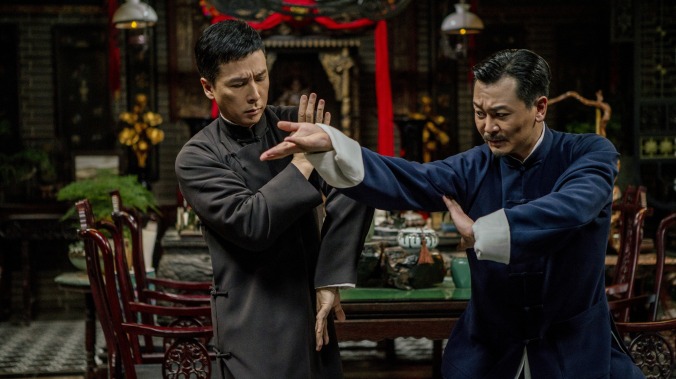The fights are weaker but the story is stronger in Donnie Yen’s final Ip Man movie

Over the decade since it was launched, the Ip Man franchise (including recent spinoff Master Z: Ip Man Legacy) has alternated between kick-ass fight sequences and soporific plotting. Granted, the narrative of these films, like those of musicals, tends to be a deliberately flimsy clothesline upon which to hang the good stuff; nobody expects to find great drama interpolated among the flurries of kicks and punches. But primary screenwriter Edmond Wong, who’s worked on every installment, specializes in tediously elaborate scripts, usually featuring multiple storylines and villains that never connect in a satisfying way (unlike Ip’s fists and the bad guys’ torsos). So it feels quite ironic that Ip Man 4: The Finale wraps up the parent series with a movie that’s comparatively weak in the kung fu department but atypically solid at killing time between set pieces. The highs are lower than usual, the lows higher. It all goes down smooth.
As a welcome change of pace, the action takes place this time primarily in San Francisco’s Chinatown, circa 1964. Having recently been diagnosed with cancer, which killed his wife in Ip Man 3, Ip (Donnie Yen, reportedly lured back one more time via a truckload of cash) travels to America in order to look into a school for his sullen teenage son (Ye He). Getting the kid a spot requires a letter of recommendation from Wan (Wu Yue), the prickly head of the local Chinese Consolidated Benevolent Association—a real-life organization created (way back in 1882) to assist Chinese Americans and combat racism. There’s no shortage of the latter here, as Ip quickly and serendipitously befriends the CCBA honcho’s young daughter (Vanda Margraf), who’s relentlessly bullied by cruel classmates. Subsequent complications lead to an immigration official (Andrew Lane) targeting the CCBA, even as Wan gets challenged by a karate-obsessed Marine (Scott Adkins) who despises foreigners in general and Chinese kung fu in particular. “America is the greatest and most powerful country on Earth,” he insists, adding “A land of supremacy.”
Not exactly subtle, and Wong (and/or the three other credited writers) still throws in a lot of clumsy exposition—“I wish you weren’t away on this business trip,” a woman tells her husband over the phone; “I’ve been in Washington, D.C.,” he helpfully explains to her upon his return—and indulges in such clichés as the guy who starts clapping alone and inspires first one other person, then a few more, then more still, and finally everyone else to join in. But the various narrative threads actually do get interwoven with reasonable skill this time, even if Ip himself mostly remains at the margins. (He basically steps in after other folks get the crap beaten out of them.) There’s some light social commentary here—the school principal cheerfully informs Ip that she’ll happily waive the letter of recommendation he’d otherwise need if he’s willing to make a $10,000 donation and join their board—and the theme of Chinese solidarity that’s always been central to the franchise accrues weight by shifting from colonialism to the diaspora.
“Who cares?” many of you are no doubt thinking. “What about the fights? What about Bruce frickin’ Lee?” Lee, who was Ip’s most famous student, gets more screen time than in the previous films, but remains a minor presence; his alleyway brawl with some random hulk early on gives uncanny doppelgänger Chan Kwok Kwan Danny (who briefly played Lee in Ip Man 3) an opportunity to mimic the legend’s signature yowls and one-inch punch, but he all but disappears thereafter. Otherwise, Yuen Woo-Ping, returning as action choreographer after directing Master Z (in which he introduced the wirework he adores), goes unusually brutal. There’s nothing here as extravagantly witty and physically impressive as, say, the tabletop duel in Ip Man 2 (choreographed by Sammo Hung); these characters just pummel each other, culminating in a climactic face-off between Ip and the proudly racist Gunnery Sergeant (Adkins does his best R. Lee Ermey impression throughout) that required a foley artist to simulate the sound of bones snapping. By the end, Donnie Yen just looks tired, and perhaps a bit relieved that this chapter of his career has come to a close.